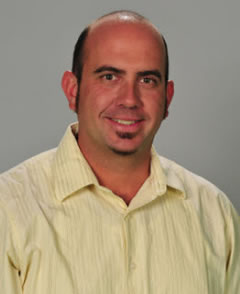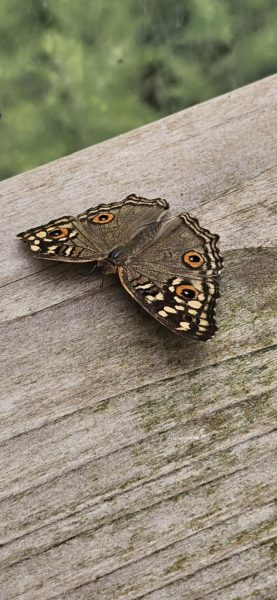Beyond the Classroom: A Profile of Jamey Trotter

Jamey Trotter stands at the head of the classroom preparing to engage in talks with his students of the looming apocalypse. He sports a gray flat cap over very short, brown hair. He does not present himself as a stern, overly serious figure; rather he is loose and calm. He opens the class with a “jam he’s been wanting to hear,” letting the song play on his laptop while the students file into the room and take their seats. Upon beginning the class, he handles himself with an unconventional style. There is no severe command for the class to assume their seats and hush, but rather he allows for a bit of breathing room between serious talks. He is engaging with the students while leaving room for a few jokes cracked here and there. The students are actually enjoying the class, not slouching in their chairs, desperately searching for a distraction from the subject matter at hand. For this class, conversation about the bleak, hopeless end of our civilization becomes a funny and intriguing subject.
Trotter becomes immersed in constructive conversation with his class, encouraging students to provide objective input to the topics of the day. He appears truly comfortable with himself as the head of the classroom. Once there have been enough profound ideas released into the air, Trotter delivers a quick one-liner to loosen up the atmosphere. He understands when to be businesslike and when to let his guard down. This appears to have a positive impact on the students themselves as they play off of his joke to make room for their own. Once the laughter has temporarily died down, favor is placed upon deconstructing and dissecting subject material to influence good conversation. Professor Trotter is anything but superficial when describing the meanings or underlying themes behind certain works. He encourages students to truly dive into the material––whether that material stems from a textbook or a literary work––to uncover what the piece is trying to convey. He may verbally nudge them until a hand shoots toward the ceiling wanting to be acknowledged. Once again though, humor finds its way into the classroom via Mr. Trotter, and the class reciprocates the favor.
Jamey Trotter found his way into classrooms like this one by pursuing his master’s degree in Composition and Rhetoric at the University of Colorado at Denver. The program he was involved with offered the opportunity for students to teach their own freshman composition classes, officially as a teacher assistant. He made it clear that the official title really wasn’t that close to the actual job description, explaining that they would essentially “throw you in the deep end” to see if you are truly teacher material or not. “That was a very interesting time in my life just because that was really terrifying,” he explains. His initial decision stemmed from his desire of wanting to really put his degree to use. After all, English and literature are in his blood: “I come from a long line of journalists. My dad and mom were both journalists.” Though both of his parents were involved in journalism (his father still is, in fact) Trotter himself is not actually a journalist, but he does head the journalism department at ACC, citing an overall passion for English and journalism. His passion, as well as his character, shines through in this setting.
“That’s when I’m the happiest at this job,” he says when speaking on being in the classroom. Trotter exhibits his true self when instructing students in the classroom. His class is his domain, a bastion where he is free to take the reins and be himself just as he would at any given moment in his daily life. It is his operating platform for offering an education, as well as offering a glimpse into what a simple conversation with Jamey Trotter would be like. “I’m the same person in the classroom that I am in real life,” he says with a smile spreading across his face. “Being in the classroom is where it’s at for me.” He stresses a strong connection with his students throughout each class he teaches. In his class, there is no room for a lifeless atmosphere where students are saddled with an overload of information to the point of becoming desk-ridden zombies. Trotter himself recalled a certain chemistry class he took that seriously lacked a teacher-to-student relationship, one that he feels would have greatly improved the outcome of the class. He also exemplifies this claim through other past experiences with students: “When you hear from folks who are appreciative of their experience, that’s very rewarding.” It is especially rewarding for Trotter when students acknowledge his teaching even if they were not given any special attention over the other students. “Developing those connections––that’s what makes a teacher a teacher, I think.”
Maintaining those connections requires Trotter to divulge his inner self when he is upon the stage. Fortunately for everybody involved, his inner self is rich with the need to have fun: “It’s important to me to have fun in the classroom and I feel like if I’m not having fun, then perhaps the class is not.” Trotter actually attempted to “have a persona” one semester as his own personal experiment to see if it was possible for him to “be a bit more reserved” in the classroom. The experiment was not a success: “When I did this experiment of developing this persona, it just did not work. It was not a good semester for me.” This realization, of course, came early in his career to mold him into the instructor he is now: “It just helped me realize, for me, it’s just like ‘Dude you gotta be yourself.’” For Trotter, humor is important when dealing with tough subjects. It is imperative to employ a humorous approach for a man who is himself drawn to people who use humor in daily conversation. “I like to laugh in class, man,” he reaffirms. Fear not, all who may enroll in one of Jamey Trotter’s future classes, for you shall be spared from a mundane, listless classroom experience.
Twelve years of instructing is only one side of a multi-faceted man. Jamey Trotter is a busy man from the moment he arises from bed to the moment he, hopefully, lays down for sleep. That sleep may be elusive to him being a father of two. “Being a father is my number one gig, even above teaching,” he says. This statement illustrates his first priority in life at the moment, as well as a foremost “job” in life. “Being a father doesn’t pay very well,” he jokes, hinting at the time-consuming but also content nature of fathering children. His involvement with his children, particularly his seven-year-old daughter, stretches beyond his being her dad. Trotter is the coach of his daughter’s soccer team. He has also snagged a position as an acting coach at Colorado Children’s Theatre, where his daughter also happens to be a student. If that weren’t already enough, Trotter has also had roles in three ballets––two in the Nutcracker and one in Peter Pan––from the Golden Recreation Center where his daughter is a ballerina. Perhaps Trotter is in debt to his daughter for his many endeavors outside of teaching.
It’s hard to believe he still has room to squeeze in disc golf, hiking, mountain biking and reading. Regular exercise is also a priority of his, even after he stars in ballets, raises two young kids, coaches soccer, coaches theatre, and manages an entire program at a community college. “I keep really busy, dude,” he says with a laugh. “I’m never bored. I’m always tired.” Though he may always be tired, he does not tire of people who are able to be empathetic: “I’m drawn to people who have the ability to understand the human experience even though they haven’t necessarily lived that experience.” He is fond of the notion that two contradicting ideas can be understood as opposed to simply being a black and white matter. On the flipside, something that may truly be tiresome to Trotter is entitlement. He acknowledges that most people have probably acted entitled at some point in their lives but as humans we “need to learn to think better.” As for those who do not wish to think better, Trotter can’t say he is a fan: “People who do that as part of their daily existence––that irks me.”
Jamey Trotter commits himself to creating a positive experience for the students he interacts with on a daily basis, as is evident in his attentiveness to his craft: “It’s definitely cliché, but making a difference in people’s lives is awesome.” Cliché or not, the genuine authenticity of his intentions as an instructor is more than apparent. From helping students improve their writing skills to strengthening transfer agreements between Arapahoe Community College and Metropolitan State University and Colorado State University, Trotter intends to boost the journalism department of this institution. If a solid education can be offered to a hopeful journalist, who knows how vast the possibilities or opportunities could be beyond a classroom.

Jake Tharan is a second year journalism student at ACC. He is the current Entertainment Editor for the Arapahoe Pinnacle, having contributed as a music critic and reporter in the past. Heavy metal is his aural pleasure, but he...








Jamey • Apr 25, 2016 at 9:52 am
Bravo! Thank you, Jake! This is all very flattering and blush-inducing…well, except for that pic (I know, it’s a stock pic of me)–I’ve lost 20 lbs since that pic was taken lol!
For real, great writing here. I feel like people can really get to know the man “Trotter” by reading this piece. 😉